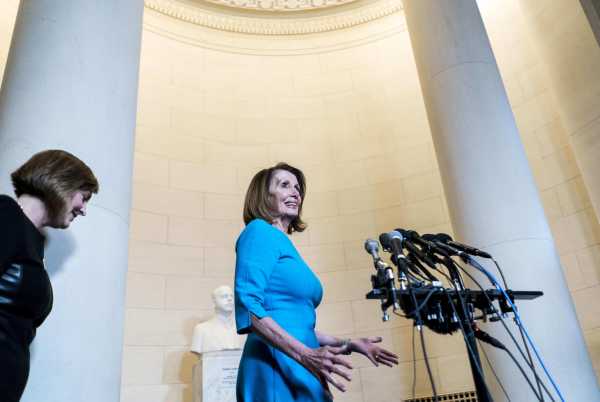
House Democrats unveiled details of their first bill in the new Congress on Friday — a sweeping anti-corruption bill aimed at stamping out the influence of money in politics and expanding voting rights.
This is House Resolution 1 — the first thing House Democrats will tackle after the speaker’s vote in early January. To be clear, this legislation has little-to-no chance of passing the Republican-controlled Senate or being signed by President Donald Trump.
But by making anti-corruption their No. 1 priority, House Democrats are throwing down the gauntlet for Republicans. A vast majority of Americans want to get the influence of money out of politics, and want Congress to pass laws to do so, according to a 2018 Pew Research survey. Given Trump’s multitude of scandals, it looks bad for Republicans to be the party opposing campaign finance reform — especially going into 2020.
“Our best friend in this debate is the public,” House Minority Leader Nancy Pelosi (D-CA) told reporters on Friday. Pelosi, who is poised to become the next House Speaker, talked about her longtime work on the issue of campaign finance reform, and talked up freshmen members who had championed the issue in 2018 — helping propel Democrats to a win.
“We believe it will have great support,” Pelosi added.
The issue is being spearheaded by Rep. John Sarbanes (MD), a longtime advocate of campaign finance reform who has long disavowed corporate PAC money. Sarbanes and other House Democrats have been working with progressive heavy hitters in the Senate including Sen. Elizabeth Warren (MA), whose own wide-ranging anti-corruption Senate bill was recently introduced in the house by Sarbanes and progressive Rep. Pramila Jayapal (WA).
On Friday morning, Sarbanes, Pelosi, and Rep. Terri Sewell (D-AL) introduced the latest details along with a group of freshmen Democratic members, including Angie Craig (MN), Veronica Escobar (TX), Mike Levin (CA), Tom Malinowski (NJ), Ilhan Omar (MN), Chris Pappas (NH), Dean Phillips (MN), Mary Gay Scanlon (PA), and Susan Wild (PA).
“You’re hearing the same clamor, which is, ‘Let’s fix this rotten system and restore people’s voice,’” Sarbanes told Vox in an interview last month. “You have to show them that you get the underlying issue. You want to, in a sense, clear the decks for democracy to work. That’s why we’re leading with that.”
What this anti-corruption bill aims to do
Sarbanes says the goal is to have a bill, which has many details yet to be hammered out, ready to be voted on by January 3 — the first day of the new session.
There are three main planks the bill covers: campaign finance reform, strengthening the government’s ethics laws, and expanding voting rights.
Campaign finance
- Public financing of campaigns, powered by small donations. Under Sarbanes’s vision, the federal government would provide a voluntary 6-1 match for candidates for president and Congress, which means for every dollar a candidate raises from small donations, the federal government would match it six times over. “If you give $100 to a candidate that’s meeting those requirements, then that candidate would get another $600 coming in behind them,” Sarbanes told Vox this summer. “The evidence and the modeling is that most candidates can do as well or better in terms of the dollars they raise if they step into this new system.”
- Passing the DISCLOSE Act, pushed by Rep. David Cicilline (RI) and Sen. Sheldon Whitehouse (RI), both Democrats from Rhode Island. This would require Super PACs and “dark money” political organizations to make their donors public.
- Passing the Honest Ads Act, championed by Sens. Amy Klobuchar (MN) and Mark Warner (VA), which would require Facebook and Twitter to disclose the source of money of political ads on their platforms, and share how much money was spent.
Ethics
- Requiring the president to disclose his or her tax returns.
- Stopping members of Congress from using taxpayer money to settle sexual harassment cases or buy first-class plane tickets.
- Giving the Office of Government Ethics the power to do more oversight and enforcement and put in stricter lobbying registration requirements.
- Create a new ethical code for the US Supreme Court, ensuring all branches of government are impacted by the new law.
Voting rights
- Creating new national automatic voter registration that asks voters to opt out, rather than opt in, ensuring more people will be signed up to vote. Early voting and online voter registration would also be promoted.
- Restoring the Voting Rights Act, part of which was dismantled by a US Supreme Court decision in 2013. Ending partisan gerrymandering in federal elections and prohibiting voter roll purging.
- Beefing up elections security, including requiring the Director of National Intelligence to do regular checks on foreign threats.
HR 1 will be a large package, but Sarbanes said in addition to passing it as the first bill, members will likely break out pieces of it into smaller bills as well that individually could get bipartisan support from Republicans in the Senate — things including the Honest Ads Act and election security.
“The combination of having some [bills] like that plus having a powerful push out of the gate the public responds to in a positive way creates political pressure for Republicans to get on board,” Sarbanes told Vox. “They are going to discover this sort of thing is popular back in their district.”
Democrats want to “walk the walk”
The anti-corruption reform effort is nothing new for Sarbanes, who stopped accepting PAC money seven years ago and once joined a frigid walk in zero-degree weather across part of New Hampshire to commemorate Doris “Granny D” Haddock, the late activist who trekked across the entire nation to make a point about campaign finance reform.
The influence of lobbying and money has been entrenched for years on both sides of the aisle, but Republicans especially have been in the news for it. Vox’s Tara Golshan and Dylan Scott noted a total of four House Republicans were embroiled in corruption scandals before the midterms — two, Chris Collins and Duncan Hunter, were reelected despite those scandals.
But even though they have a good foil in House Republicans, Sarbanes says his party needs to undergo a serious reckoning of its own.
“Walk the walk, and we’ve got to walk it quick,” Sarbanes told Vox in a recent interview. “A lot of [voters] don’t believe it can happen because the system is rigged. That’s why when you come with a plan for that, too, it sort of caffeinates everything else. It makes them feel like, okay now you’re talking.”
“It’s not until you come here and begin to serve that you understand how woven it is into the fabric of how Washington operates,” Sarbanes continued. The Congress member compared his own refusal of PAC money to putting on “night-vision goggles that have you then see how money flows everywhere here.”
Democrats know they don’t actually have a shot of passing HR-1 through the Senate, nor getting it off the president’s desk. But they recognize they need to get serious about the issue, even if the other party won’t.
Correction: Due to an incorrect source paper, an earlier version of this story said this bill will encourage reforms including online voting. It is encouraging online voter registration.
Sourse: vox.com






